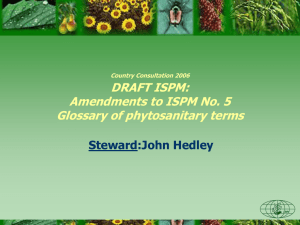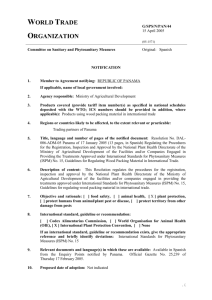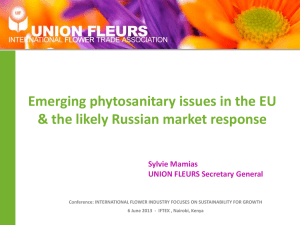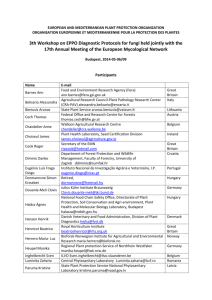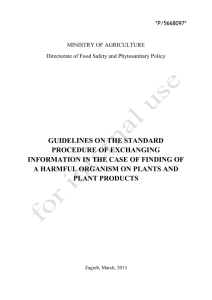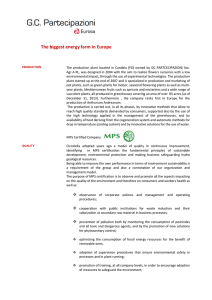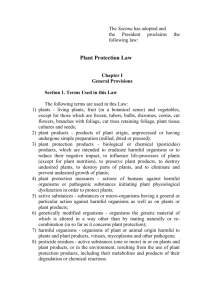STANDARD TWINNING PROJECT FICHE
advertisement
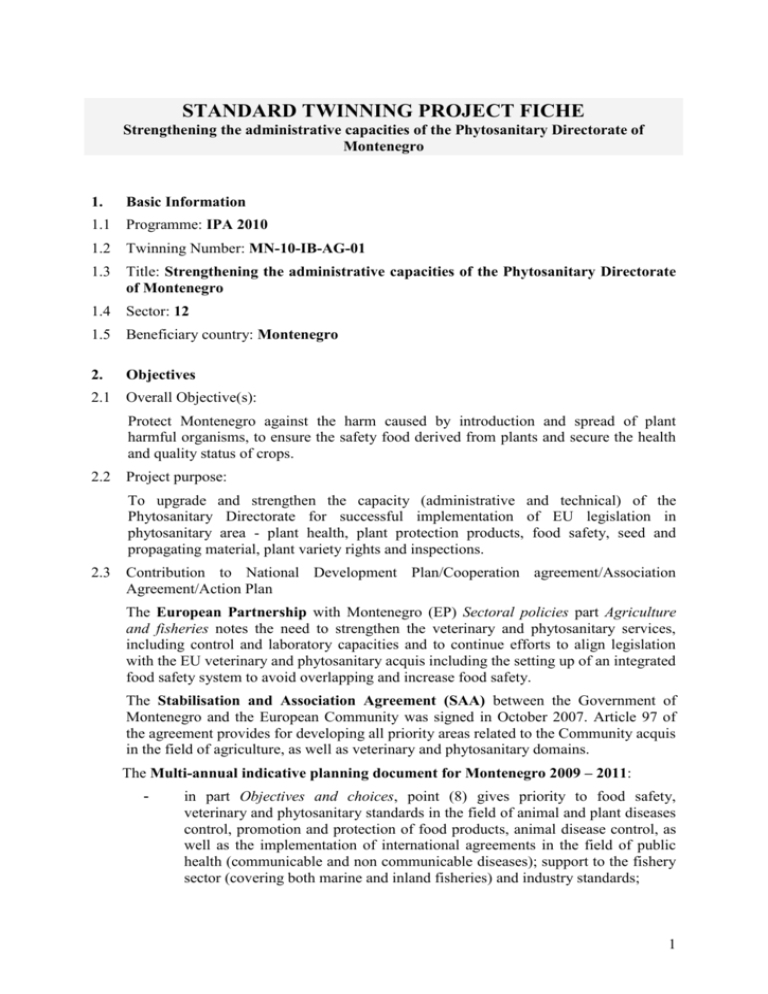
STANDARD TWINNING PROJECT FICHE Strengthening the administrative capacities of the Phytosanitary Directorate of Montenegro 1. Basic Information 1.1 Programme: IPA 2010 1.2 Twinning Number: MN-10-IB-AG-01 1.3 Title: Strengthening the administrative capacities of the Phytosanitary Directorate of Montenegro 1.4 Sector: 12 1.5 Beneficiary country: Montenegro 2. Objectives 2.1 Overall Objective(s): Protect Montenegro against the harm caused by introduction and spread of plant harmful organisms, to ensure the safety food derived from plants and secure the health and quality status of crops. 2.2 Project purpose: To upgrade and strengthen the capacity (administrative and technical) of the Phytosanitary Directorate for successful implementation of EU legislation in phytosanitary area - plant health, plant protection products, food safety, seed and propagating material, plant variety rights and inspections. 2.3 Contribution to National Development Plan/Cooperation agreement/Association Agreement/Action Plan The European Partnership with Montenegro (EP) Sectoral policies part Agriculture and fisheries notes the need to strengthen the veterinary and phytosanitary services, including control and laboratory capacities and to continue efforts to align legislation with the EU veterinary and phytosanitary acquis including the setting up of an integrated food safety system to avoid overlapping and increase food safety. The Stabilisation and Association Agreement (SAA) between the Government of Montenegro and the European Community was signed in October 2007. Article 97 of the agreement provides for developing all priority areas related to the Community acquis in the field of agriculture, as well as veterinary and phytosanitary domains. The Multi-annual indicative planning document for Montenegro 2009 – 2011: - in part Objectives and choices, point (8) gives priority to food safety, veterinary and phytosanitary standards in the field of animal and plant diseases control, promotion and protection of food products, animal disease control, as well as the implementation of international agreements in the field of public health (communicable and non communicable diseases); support to the fishery sector (covering both marine and inland fisheries) and industry standards; 1 - in part Expected results and indicators is noted: Veterinary, phyto-sanitary and food safety legislation is progressively aligned to EU acquis; this would include increased capacity of veterinary and phyto-sanitary controls; increased awareness about rights and obligations on the side of producers and consumers, improved promotion and protection of food products, product safety mechanisms are in line with the EU good practice. Indicators: Exports and imports of foodstuffs tested and followed-up; improved public health indicators; number of foodstuffs with protected designation of origin, protected geographical indication and traditional speciality guaranteed. The Strategy on food production and rural development – Montenegro’s agriculture and the European Union (adopted in 2006) provides the basis for further major reforms and legislative work required for phytosanitary policy. The Strategy on Integrated Border Management (IBM) was adopted in February 2006. Four main bodies (Ministry of Internal affairs, Customs, Veterinary Service, Phytosanitary Directorate) are currently controlling implementation (control mechanism for integrated border management at national level). The National Programme for European Integration has been finalised and in part 3.12.3. Phytosanitary policies have been anticipated for transposition of EU legislation in phytosanitary area for 2008-2012. 3. Description 3.1 Background and justification: The European Commission’s Progress Report October 2006 – October 2007 stated that some progress had been made in the phytosanitary area, and noted that some laws in phytosanitary area were adopted. It also noted that Montenegro must review organization in this sector and assign clear competences and authorities and strengthen capacity for control. The single authority for phytosanitary matters in Montenegro is the Phytosanitary Directorate (PD) under the supervision of the Ministry of Agriculture and Rural Development. The PD of Montenegro was established by the Regulation on Amendments and Modifications to the Regulation on Organization and the Work of State Administration (“Official Journal of Montenegro”, No. 43/2008) and was formed assuming affairs regarding plant health protection, plant protection products, seeds and propagating material, plant variety rights, food safety. PD started with work in 2009. The PD also provides inspection controls inside the country and on the borders by phytosanitary inspectors. The PD is responsible for drafting and enforcing legislation. At the central level the PD has: Division for plant health protection, Division for Seeds and propagation material, plant variety protection and GMO, Division for Plant protection products, plant nutrition products and food safety and Division for phytosanitary inspectorate. The Division for phytosanitary inspectorate at the territorial (local) level has 7 departments. 2 The professional and technical support to the PD (laboratory analysis, job of public interest) in phytosanitary area is provided by Biotechnical Faculty, Centre for Ecotoxicological Research in Montenegro, Podgorica (physic-chemical analysis of pesticides) and Public Health Institute (laboratory testing of food for residues of plant protection products). Strengths are: the PD at this stage has sufficient number of employees (administrative staff, inspectors etc.), available national budget, adequate office space and basic equipment available. Weaknesses and threats are: information system doesn’t exist, insufficient informative knowledge of employees, poor experience in use EU standards from phytosanitary area, import of plant shipments represents potential hazards for spreading of plant harmful organisms and in finally represent a high risk for the public health, some facilities for phytosanitary controls are still in unsatisfactory conditions, a relatively large quantity of phytosanitary goods, which come into Montenegro, may be a source of infection, often latent, and may cause considerable damages in plant production. In order to prevent the spread of plant harmful organisms, they can be put in quarantine under special conditions, until the attendance or absence of the quarantine harmful organisms is confirmed. In order to enforce the newly adopted legislation in the phytosanitary area in compliance with EU standards and best practices, it is necessary to continue with the strengthening and modernization of appropriate infrastructure facilities, both administrative and technical. This project should help to address these weaknesses and optimize the use of existing capacities. This project is necessary for the PD of Montenegro in order to provide employees with modern know how which should result in more effective work. The setting up of an integrated information system within the PD should provide for better communication and exchange of information among staff. 3.2 Linked activities: This project will take into consideration experiences gained during the implementation of EU funded projects. EU funded projects: - Strengthening of the Veterinary and Phytosanitary services technical assistance, Montenegro (FRY) - No. 03MTG01/05/001 - Main results concerning Phytosanitary services are the following: Drafted Plant Health Law, Prepared proposals for the organization of the future Phytosanitary Directorate, Purchase of laboratory equipment. - IPA 2007/ Legal harmonisation/No. IBJLS01- Phytosanitary Directorate was part of the project (drafting legal act according EU requirements). Within the Component 1, Phytosanirary Directorate was assisted in legal harmonisation process by preparation of the following pieces of legislation: o Draft of new rules on the marketing of seed potatoes o Draft national regulations on harmful organisms o Draft sub-law regulation for marketing of cereal seed o Draft sub-law regulation for detailed procedure for national listing of plant varieties 3 o Draft Rules on protective measures against the introduction and spread of organisms harmful to plants or plant products o Draft amendments to Plant Health Law o Draft of new Rules on the marketing of material for the vegetative propagation of vine. In addition, study visits to the relevant Slovenian Institutions were organized for the representatives of each Division of Phytosanitary Directorate. - IPA 2008/Development of Food Safety Services in Montenegro/No. 128208/C/SER/ME – Phytosanitary Directorate (Division for food safety) is one of the beneficiaries of the project (workshops, trainings etc.). The project aims to ensure Food safety for the benefit of consumers and the raise in food stuff production and trade. The main purpose is to improve the operational capacity for food safety control in Montenegro. Project intends to achieve 4 main results (project components) which are: 1. Strengthening of the public veterinary, phytosanitary and sanitary services; 2. Building competence within Montenegrin public service to deliver effective food safety systems; 3. Strengthening of the food safety laboratories and further collaboration 4. Setting up an integrated IT system for the management of food safety data. 3.3 Results: The project will achieve the following results: Result 1: National legal framework in the phytosanitary area is harmonized with EU legislation. Indicators: - phytosanitary legislation in force reviewed, gaps are identified and relevant legislation is adopted by the relevant executive and legislative institutions; - inspection control, prevention, administrative control, urgency and other types of measures regularly implemented: control of import, export and production in accordance to EU standards, information exchange with phytosanitary directorates of other countries, custom offices and other related institutions. Result 2: Inspection and other administrative and operational procedures in the phytosanitary area developed and adopted. Indicators: - Registries developed and functional (keep records about producers, importers, exporters etc.); - Publications issued (instructions for administrative staff, inspectors, importers, exporters, and measures against harmful organisms etc.); - published manuals and training manuals with procedure for: a. inspections, notification of interception, sampling; b. identification plant harmful organisms according annexes of Council Directive 2000/29/EC of 8 May 2000; 4 c. registration of operators; d. import from third countries; e. monitoring pesticide residues; f. placing on the market PPP; g. marketing and production of seeds and propagating material; h. plant variety rights. Result 3: Inspectors, administration and laboratory staff are capable to properly carry out related duties in accordance with the acquis. Indicators: - 18 experts are trained to perform inspection control; - 10 experts are trained for administration jobs; - 10 experts from: seed laboratory, phytosanitary laboratory are trained (in diagnostic methods in the field of mycology, virology, entomology, nematology, bacteriology etc.); Result 4: Set up and improved information system. Indicators: 3.4 - manuals for mandatory exchange of information published; - new software installed and functional and connected with web side; - staff trained; - other institutions - users of information system acquainted with the system; - stakeholders and public are familiar. Activities: (1) Legislation approximation activities 1.1 Reviews of existing and drafting new legislation and amendments (including bylaws, rulebooks, instructions, manuals etc.); 1.2 Necessary corrections to bring the control system in full conformity with the acquis; Focus to be put on: - Analysis of the current state of play of legislation in comparison with the EU acquis and preparation of a Table of correspondence; - Preparation of legislative proposals according to the identified priorities; - Upgrading and preparation (where needed) of the inspection and control plans; - Upgrading and preparation (where needed) of the contingency plans; - Preparation of a national team of experts able to draft national legislation on phytosanitary area; (2) Capacity building activities 2.1 Review of the existing operational procedures and institutional set up; 5 2.2 Advisory and development of new procedures for effective implementation of EU legislation; Focus to be put on: - Analysis of the needs of all phytosanitary area related state bodies in terms of equipment, IT, training, software development, operational and procedural systems, etc. Preparation of the technical specification for the purchase of equipment for testing and analysis; - developing appropriate tools (e.g. diagnosis, identification and detection methods); - training for relevant staff (inspectors, administration and laboratory staff), study visits to the institutions dealing with similar topics within the EU member states; - Provision of advisory services, advise and on-going support on phytosanitary to all state bodies in the chain; - Organization of training on at least 3 key subjects: (i) EU system for phytosanitary control, (ii) effective methods for inspections, control and monitoring, (iii) quality sampling incl. ensuring traceability of sampling; (iv) effective testing methods in line with the EU standards. More particularly, the training has to cover general principles of phytosanitary area and all included issues: (i) Plant Health – Harmful Organisms a. General control measures b. Specific control measures c. Protected zones d. Inspections and notification of interception e. Registration of operators - Plant passports f. Import from third countries (ii) Plant Health – Plant Protection Products – Food `safety a. Placing on the market b. Pesticide residues (iii) Quality of Seeds and Propagating Material, Plant Variety Rights (iv) Phytosanitary inspector (3) Data and information systems activities: 3.1 Training needs assessment and provision of training for relevant staff (inspectors, administration and laboratory staff) for new IT system and other institutions who dealing with phytosanitary issues; 3.2 Needs assessment and purchase of necessary equipment; 3.3 Developing appropriate tools (e.g. new applications or other IT tools); Focus to be put on: 6 - Upgrading and preparation (where needed) of the inspection and control plans; - Upgrading and preparation (where needed) of the contingency plans; - Information and awareness raising activities – focus to be put on: - Organization of an information and awareness raising campaign on phytosanitary issue; - Establishing of an integrated automated and linked IT system (4) Project management activities – focus to be put on: 4.1 Developing of procedures for communication and information exchange; 4.2 Needs assessment and purchase of necessary equipment and software; 4.3 Staff training needs assessment and provision of training; 4.4 Communication with stakeholders and public. Focus to be put on: 3.5 - Coordination of the activities of all long- and short-term experts involved in project implementation; - Evaluation of the impact of purchased equipment on the phytosanitary control; - Reporting, communication with the beneficiaries Means/ Input from the MS Partner Administration: 3.5.1 Profile and tasks of the Project Leader The PL must have at least 10 years of relevant practical working experience and be official from a Member State (MS) law enforcement body with broad knowledge and practical experience in phytosanitary field in EU, new Member States or Candidate Countries. The PL will drive the implementation of the service contract, provide overall guidance on project orientation and focus and ensure that contract objectives are met. The PL should have proven management skills and experience. The PL will continue to work at his/her MS administration but devote some of his/her time to conceive, supervise and co-ordinate the overall thrust of the Twinning project and ensure the commitment of the MS Partner to the Twinning Project. The PL will allocate a minimum of 3 days per month including one visit every 3 months to Montenegro as long as the project lasts. 3.5.2 Profile and tasks of the Resident Twinning Adviser (RTA) – 21 months The RTA will be a senior officer with at least 10 years of professional experience in phytosanitary areas covered by this assignment: He/she will ensure timely identification of short term and other expert requirements, determine their profiles and inputs, supervise and coordinate their actions and ensure quality control of all team outputs. Besides the management aspects, he/she will particularly responsible for: Upgrading and preparation (where needed) of the control plans for inspection; 7 Upgrading and preparation (where needed) of the contingency plans; Implementation of the awareness campaigns. The required qualifications, skills and experience include: university degree in a relevant phytosanitary discipline, along with strong communication and leadership skills; at least 10 years of professional experience in the phytosanitary sector preferably gathered in the EU and in CEEC/transition economies; excellent practical experience in phytosanitary inspections, policy and strategy formulation; excellent understanding of phytosanitary issues, including related EU standards and best practices; very good command of English, both spoken and written; excellent analytical, evaluation, management and planning skills; excellent communication skills in terms communications, mediation and report writing; ability to adapt quickly to the local environment and understand constraints and opportunities of it; previous experience as team leader or project director in a long term assistance project in a third country (new EU Member States and/or EU candidate or acceding countries is an advantage) in a relevant thematic area. Knowledge of local language will be considered. of interpersonal 3.5.3 Profile and tasks of the short-term experts Short-term experts (STEs) will cover the activities in the following fields: 1. plant health 2. plant protection products 3. pesticide residue 4. seeds 5. propagating material 6. phytosanitary inspection 7. IT 8. relevant laboratories 3.5.3.1 The STEs in the field of plant health, plant protection products, pesticide residue, seeds, propagation material and phytosanitary inspection should have: relevant University degree; minimum of 5 years professional experience in the respective field; very good written and oral command of English; 8 up to date and in depth knowledge of the EU legislation, relevant procedures and institutional structures in the respective field required to implement the relevant policy; excellent knowledge on the issues in the relevant field in transition economies; previous experience in assessing third country legislation and institutional arrangements (including inspection, laboratory control etc.) for compliance with EU requirements in the relevant field is desirable, as experience in having assisted in defining relevant policy strategy and worked in legal alignment and institutional reform projects including laboratory control and accreditation in new Member States or Candidate Countries; previous experience in needs analysis related to training and capacity building; and in building effective training programmes based on participatory training approaches; to be experienced in provision of training and consultancy in relation to the standards in the relevant field as well as public health, consumer protection, inspection and similar. The STEs shall be responsible for: activities related to the approximation of the legislation of Montenegro to the acquis: analysis of the current state of play in comparison with the acquis, drafting of legislative proposals and recommendations, providing consultation and training of a group of national experts on legislative drafting in relation to the relevant field. developing and implementing all capacity building measures – consultancy, on-going support and training activities, assessment of the needs related to human resource management and development, as well as for drafting of operational rules and procedures. 3.5.3.2 The specific task of the STE for phytosanitary inspection shall be: analysis of the current state of play in comparison with the EU best practice, drafting of annual control plans for inspection, implementing activities related to the manuals for the phytosanitary inspection, providing consultation and training of phytosanitary inspectors in relation to perform control in phytosanitary field (plant health, seeds, propagating material and plant variety rights, pesticide etc.) 3.5.3.3 The STE for IT should have: previous experience in evaluation of the IT needs and developing IT systems, preferably for the needs of the phytosanitary systems in the EU or candidate countries. The STE shall be responsible for: assessment of the IT needs of the relevant institutions and the establishment of an IT system. 3.5.3.4 The STEs for laboratories (seed laboratory, phytosanitary laboratory etc.) shall be responsible for: 9 activities related to trainings in diagnostic methods in the field of mycology, virology, entomology, nematology, bacteriology etc. 3.5.3.5 The number of STEs, allocation of the working days and the time table of the activities should meet the absorption capacities of the Phytosanitary Directorate administration. 4. Institutional Framework The single authority for phytosanitary area in Montenegro is the Phytosanitary Directorate (PD) under the supervision of the Ministry of Agriculture and Rural Development. The Phytosanitary Directorate of Montenegro was established by the Regulation on Amendments and Modifications to the Regulation on Organization and the Work of State Administration (“Official Journal of Montenegro”, No. 43/2008) and was formed assuming affairs regarding: plant health protection, plant protection products, plant nutrition products, seeds and propagating material, GMO, plant variety rights, plant genetic resource food safety. The Phytosanitary Directorate also provides inspection controls inside country and on the borders by phytosanitary inspectors. The Phytosanitary Directorate is responsible for drafting and enforcing legislation. At the central level the Phytosanitary Directorate has: Division for plant health protection, Division for Seeds and propagation material, plant variety protection and GMO, Division for Plant protection products, plant nutrition products and food safety and Division for phytosanitary inspectorate. Division for phytosanitary inspectorate at the territorial (local) level has 7 departments. The professional and technical support to the Phytosanitary Directorate (laboratory analysis, job of public interest) in phytosanitary area is provided by: 1) Biotechnical Faculty: a. Centre for Plant Protection, Podgorica – which includes the phytosanitary laboratory and analyzing the biological effectiveness of pesticides; b. Centre for Sub-Tropical Cultures, Bar – analyzing physical and chemical attributes of pesticides; 10 c. Centre for crop, vegetable and fodder plants, Podgorica – seed certification; 2) Centre for Eco-toxicological Research in Montenegro, Podgorica (physicchemical analysis of pesticides); 3) Public Health Institute - (laboratory testing of food for residues of plant protection products). 11 Organizational Scheme of the Phytosanitary Directorate PHYTOSANITARY DIRECTORATE Director SERVICE FOR GENERAL AFFAIRS SECTOR FOR PHYTOSANITARY AFFAIRS Assistant Director Department for Inspection Supervision Department for Plant Helath Protection Departmetnt for Plant Protection Products, Plant Nutrition Products and Food Safety Department for Seeds and Planting Material, Plant Varieties Protection and GMO Municipal units of the Phytosanitary inspectorate 12 Flow chart - competence level - line of management of services in charge of phytosanitary MINISTRY OF AGRICULTURE AND RURAL DEVELOPMENT Minister Competent authority MINISTRY OF HEALTH Minister MINISTRY OF PHYSICAL PLANNING AND ENVIRONMENTAL PROTECTION Minister PHYTOSANITARY ADMINISTRATION Director Single authority Centre for Eco-toxicological Researches & Public Health Institute Laboratory analyses: Physico-chemical analyses of food of plant origin at primary production level. Pesticide residues. Phytosanitary controls Plant health protection Plant protection products Pesticide residues Seed and planting material Plant variety protection GMOs Food of plant origin at the primary production level import/export registration inspection control of authorized institutions phytosanitary inspectorate - BIOTECHNICAL FACULTY laboratory analyses Forestry Administration - Monitoring of plant health situation; occurrence and spreading of harmful organisms; Forecasting occurrence, detection and risk assessment with regard to harmful organisms; Implementation of prevention and control measures Laboratory testing of plants, plant products and establishments under supervision Diagnostics of harmful organisms Testing the quality of seed and planting material Technical control over production of seed and planting material Forestry Inspectorate Extension Service in Plant Production Local governance* CUSTOMS ADMINISTRATION (customs procedures) Plant keepers Operators 13 5. Budget The budget allocated for this Twinning Contract is EUR 700.000. 6. Implementation Arrangements 6.1 Implementing Agency responsible for tendering, contracting and accounting Mr Nicola Bertolini, Head of Operations Delegation of the European Union to Montenegro Vuka Karadžića 12, 81 000 Podgorica, Montenegro Telephone: +382 20 444 600 Fax: +382 20 444 666 Email: Nicola.BERTOLINI@ec.europa.eu. 6.2 Main counterpart in the BC, Zorka Prljevic, director Phytosanitary Directorate Bratstva i jedinstva bb, 20000 Podgorica, Montenegro Tel. +382 20 621 111 Fax + 382 20 621 008 Email: fitosanitarnaupravacg@t-com.me The Contact person will be: Maja Petrovic Senior Adviser Phytosanitary Directorate Bratstva i jedinstva bb, 20000 Podgorica, Montenegro Tel. +382 20 621 111 Fax + 382 20 621 008 Email: maja.petrovic@fu.gov.me, fitosanitarnaupravacg@t-com.me 6.3 Contracts One Twinning Contract 7. Implementation Schedule (indicative) 7.1 Launching of the call for proposals First quarter of 2011 7.2 Start of project activities Third quarter of 2011 7.3 Project completion Third quarter of 2012 7.4 Duration of the implementation period 12 months (15 Months legal duration) 14 8. Sustainability The Montenegrin strategic framework for achieving progress in the phytosanitary area and the sustained commitment of the authorities is an important guarantee for the sustainability of the project results. The sustainability of this project's results will be ensured by the continuation of the reforms phytosanitary area. The phytosanitary conditions in Montenegro will be upgraded. Some seeds and plants for planting, and a limited number of end products for consumer use, must travel with a plant passport issued by growers authorised to do so. The plant passport specifies that the material originates from a registered and officially inspected place of production. Further nondiscriminatory checks on plants and plant products may be carried out en route or at the final destination. These checks can be targeted where there is earlier evidence of noncompliance. Authorisation of growers is based on regular inspection of their premises for the presence of harmful organisms by or on behalf of the Phytosanitary Directorate. Specific phytosanitary provisions have huge impacts on trade in general. The Montenegro plant health policy needs to take into account its impacts on society at large, and to strike an appropriate balance between social, economic and environmental impacts. The most important milestones of the project in terms of impact are: 9. - the Phytosanitary Directorate (administrative staff, inspectors etc.) is fully operational; - adoption and implementation of the acquis communautaire; - laboratories developing procedures in accordance with the EU standards. Crosscutting issues Citizens value an unspoilt and healthy environment. Entry and establishment of harmful organisms often results in increased use of pesticide and could thus impact negatively on the environment. Montenegro citizens would expect to stimulate and facilitate the agriculture system as a whole (growers, farmers and the associated supply and marketing chains), as this is a major employer and source of income. They would presumably be in favour of plant health measures, in so far as these would protect economic growth, employment and rural economies against harm inflicted by harmful organisms, unless the cost-benefit balance for society at large is negative or when measures are perceived as unfair to individual growers or private persons. Citizens value an unspoilt landscape and are concerned about the rapid loss of natural habitats, biodiversity and plant resources worldwide. Entry and establishment of harmful organisms may lead to serious damage to street trees, public and private green, recreational forests and to disruption and loss of natural ecosystems and habitats. 10. Conditionality and sequencing A key condition for the implementation of the Twinning project is that the PD remains committed to implementation of the EU phytosanitary policy. Additional conditionality’s including: 15 Allocation of sufficient and stable financial, technical and human resources to the PD. Commitment on behalf of senior level officials and others experts (inspectors, administration and laboratory staff) of PD services involved in project implementation Adopted rule-books, manuals, control plans. Qualified staff available and actively participating to the project activities. Available premises and infrastructure. A Steering Committee consisting of key stakeholders will be established for supervising the implementation of the Twinning Contract. In terms of sequencing, it is planned that the Twinning Contract will be signed before the contract for supply in order to provide for the Twinning MS Partner assessing the provision of equipment and software and advising on the Technical Specifications for the supply. The beneficiary must provide a written commitment regarding its co-financing obligation under the supply and service contracts related to the activities and objectives of the Twinning Contract. ANNEXES 1. Logical framework matrix in standard format 2. Reference to laws, regulations and strategic documents 16 ANNEX I: Logical framework matrix in standard format Programme name and number: Strenghthening the administrative capacities of the Phytosanitary Directorate of Montenegro LOGFRAME Overall objective - protect Montenegro against the harm caused by introduction and spread of plant harmful organisms, to ensure the safety food derived from plants and secure the health and quality status of crops in Montenegro Project purpose Upgraded and strenghtened capacity of Phytosanitary Directorate for sucessful implemetation and transposition of EU legislation in phytosanitary area - plant health, plant protection products, seed and propagating material, plant variety rights and inspections Contracting period expires two years from the date of the conclusion of the Financing Agreement Disbursement period expires one year from the final date for execution of contracts Total budget: € 0.77 million EUR IPA budget: € 0.7 million EUR Objectively verifiable indicators - ensured safety plant origin food - secured safe trade - provided a legal implementation framework - checked movements of plants - controlled harmful organisms - Implemented preventative measures to guard against the introduction and spread of organisms harmful to plants or plant products within Montenegro - contributed plant health protection through sustainable production - ensured quality conditions for the sale of seeds and propagating material - Covered the intellectual property rights granted to plant varieties Objectively verifiable indicators - relevant EU legislation in the Phytosanitary area adopted - EU requirements from phytosanitary area are prepared for implementation: - output control of national producers - upgraded plant health protection - harmonized system of PPPs in Montenegro with EU - harmonized system of quality of seeds and propagating material - harmonized system of plants variety rights - upgraded inspections controls Sources of Verification - Official Gazette - Government monitoring reports - EU monitoring reports - Quarterly experts’ reports - Feedback requested from applicants on their opinion of changes implemented Sources of Verification Phytosanitary Directorate web-site EC progress report Media Assumptions • Sufficient number and quality of scientific staff and well trained personnel • Continuing good relations and coordination with other services and institutions 17 Results 1. National legal framework in the phytosanitary area is harmonized with EU legislation Objectively verifiable indicators - Phytosanitary legislation adopted by the relevant executive and legislative institutions - Inspection controls, prevention, administrative control, urgency and other types of measures regularly implemented: control of import, export and production in accordance to EU standards, information exchange with phytosanitary directorates, custom offices and other related institutions 2. Inspection and other administrative and operational procedures in the phytosanitary area developed and adopted - 3. Inspectors, administration and laboratory staff are capable to properly carry out related duties in accordance to the acquis 4. Set up and improved information system Sources of Verification • Official Gazette. • Manuals • Project reports • Media • Phytosanitary Directorate web-site Assumptions • Continuing Government support • Phytosanitary Directorate capable of retaining key staff • Systems and procedures in place are accepted, evaluated and aplicable • Acceptance of employees and other related institutions and public service of new information system Registries developed and functional (keep records about producers, importers, exporters…) Publications issued (instructions for administrative staff, inspectors, importers, exporters, and measures against harmful organisms…) Published manuals for procedures: inspections, notification of interception, sampling, plant harmful organisms registration of operators import from third countries pesticide residues placing on the market PPP seeds and propagating material plant variety rights Inspectors, administration and laboratory staff are trained: 18 experts are trained to perform inspection control and detection of carantine pests 10 experts are trained for administration jobs (procedures, registry…) 10 experts are traind in diagnostic methods in the field of entomology, mycology, virology, nematology, bacteriology .... Manuals for mandatory exchange of information published New software installed and functional Staff trained Other institutions – users of information system acquainted with the system Stakeholders and public are familiar 18 Activities 1.1. Review of existing and drafting of necessary legislation and amendments (incl. bylaws and rulebooks) 1.2. Necessary corrections to bring the control system in full conformity with the acquis 2.1. Review of the existing operational procedures and institutional set-up 2.2. Advisory and development of new procedures for effective implementation of EU legislation 3.1. Training needs assessment and provision of training for relevant administrative staff 3.2. Needs assessment and purchase of necessary equipment 3.3. Developing appropriate tools (e.g. diagnosis, identification and detection methods) 4.1. Developing of procedures for communication and information exchange 4.2. Needs assessment and purchase of necessary equipment and software 4.3. Staff training needs assessment and provision of training 4.4. Provision of information and training ot other relevant institutions on new information system 4.5. Communication with stakeholders and cizitens Means Twinning contract – IPA funds 1.1, 1.2, 2.1, 2.2, 3.1, 4.1, 4.2, 4.3, 4.4, 4.5 Costs Total : € 770,000 IPA funds : € 700,000 Supply contract(s) – National contribution 3.2, 3.3, National contribution: € 70,000 Assumptions • Good level of cooperation between twinning partners • Availability of qualified staff retained • Continuing support by the relevant Government institutions Preconditions - sufficient number of employees - available national budget - adequate office space and basic equipment available 19 ANNEX II: Reference to laws, regulations and strategic documents Law on Plant Health Protection (Official Gazette of RM, No. 28/06) and the following secondary legislation: Regulation on the Forecast and Reporting Jobs in Plant Protection Domain (Official Gazette of RM, No. 65/99); Rule Book on the Health Check of Crops and the Establishment for the Production of Seeds, Propagating and Planting Materials and on the Health Check of Seeds, Propagating and Planting Materials (Official Gazette of FRY, No. 66/99) / Criteria for Establishing the Health Status of Crops and Establishments, Seeds, Propagating and Planting Materials; Criteria for Establishing the Health Status of Crops and Establishments, Seeds, Propagating and Planting Materials; Rule Book on the Services Intended for the Plant Health Protection Domain (Official Gazette of FRY, No. 42/99); Rule Book on the Health Checks of Plant Consignments in the Trade Across the State Border (Official Gazette of FRY, No. 69/99); Ordinance Specifying the Varieties of Imported Planting Materials and for Monitoring the Health Status of the End Users (Official Gazette of FRY, No.8/99); Ordinance Putting the Ban on Import and Transporting of Certain Varieties of Plants and for Putting in Quarantine Certain Varieties of Plants Imported for Growing (Official Gazette of FRY, No. 65/99); List of Quarantine Harmful Organisms (Official Gazette of FRY, No. 8/99); List of Economically Harmful Organisms (Official Gazette of FRY, Nos.65/99 and 67/99); Instruction for Publishing the Data on the Introduction and Spread of Newly Discovered Quarantine Harmful Organisms as of December 01, 1999. Law of Plant Protection Products (Official Gazette of RM, No. 51/08): Rule Book on the Methods of Pesticides Testing (Official Gazette of FRY, No. 11/99); Rule Book on the Requirements for the Production Line, Trade, Import and Sampling of Pesticides and Compost (Official Gazette of FRY, No. 12/99); Rule Book on the Types of Packing for Pesticides and Compost and on the Destruction of Pesticides and Compost (Official Gazette of FRY, No. 35/99). Law on the Agricultural Plant Seeds (Official Gazette of RM, No. 28/06) and the Law on Planting Material (Official Gazette of RM, No. 28/06), whereas the forestry area is governed under Law on the Forest Tree Reproductive Material (Official Gazette of RM, No. National Program for Integration 279 37/2007). Law on the Plant Variety Protection (Official Gazette of RM, No. 48/07, 48/08). 20
